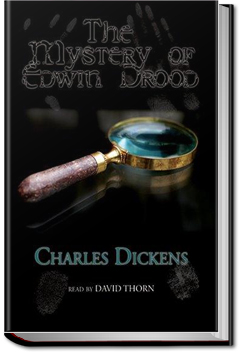The Mystery of Edwin Drood is the final novel by Charles Dickens. It is a mystery indeed; the serial novel was just half completed at the time of Dickens’ death – leading to much speculation how it might have ended.
The novel is named after Edwin Drood, one of the characters, but it mostly tells the story of his uncle, a choirmaster named John Jasper, who is in love with his pupil, Rosa Bud. Miss Bud is Drood’s fiancée, and has also caught the eye of the high-spirited and hot-tempered Neville Landless! Landless comes from Ceylon with his twin sister, Helena. Neville Landless and Edwin Drood take a dislike to one another the moment they meet.
The story is set in Cloisterham, a lightly fictionalised Rochester (in Kent, England). Rochester is close to Dicken’s country house Gad’s Hill Place, where the final chapter was written and where Dickens died.
#8216;Curse your souls and bodies, come here and be
blessed!’ still his philanthropy was of that gunpowderous
sort that the difference between it and animosity was hard to
determine. You were to abolish military force, but you were
first to bring all commanding officers who had done their duty,
to trial by court-martial for that offence, and shoot them.
You were to abolish war, but were to make converts by making war
upon them, and charging them with loving war as the apple of
their eye. You were to have no capital punishment, but were
first to sweep off the face of the earth all legislators,
jurists, and judges, who were of the contrary opinion. You
were to have universal concord, and were to get it by eliminating
all the people who wouldn’t, or conscientiously
couldn’t, be concordant. You were to love your
brother as yourself, but after an indefinite interval of
maligning him (very much as if you hated him), and calling him
all manner of names. Above all things, you were to do
nothing in private, or on your own account. You were to go
to the offices of the Haven of Philanthropy, and put your name
down as a Member and a Professing Philanthropist. Then, you
were to pay up your subscription, get your card of membership and
your riband and medal, and were evermore to live upon a platform,
and evermore to say what Mr. Honeythunder said, and what the
Treasurer said, and what the sub-Treasurer said, and what the
Committee said, and what the sub-Committee said, and what the
Secretary said, and what the Vice-Secretary said. And this
was usually said in the unanimously-carried resolution under hand
and seal, to the effect: ‘That this assembled Body of
Professing Philanthropists views, with indignant scorn and
contempt, not unmixed with utter detestation and loathing
abhorrence’—in short, the baseness of all those who
do not belong to it, and pledges itself to make as many obnoxious
sta



The Mystery of Edwin Drood first published in 1870, is certainly one of the earliest, although not the first. That privilege is due to a work in German published in 1819, and